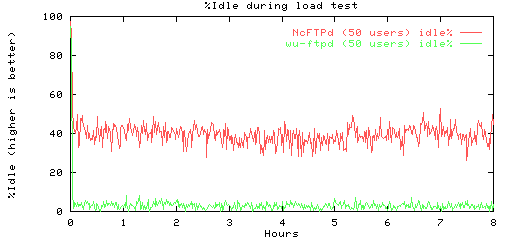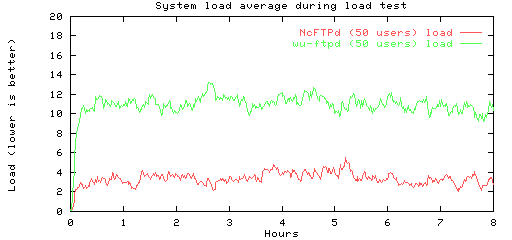
This set of tests was run on a Linux 2.0 system (90 MHz Pentium, 40 MB RAM), with NcFTPd running 50 users and wu-ftpd running 50 users.

The first graph indicates how busy (too busy!) the system is while wu-ftpd and 50 Monkeys are pounding the system. The same graph shows that NcFTPd and the 50 Monkeys are being handled with plenty of time to spare.

The second graph shows the load average during the test, and it indicates that wu-ftpd has probably reached it's maximum number of users. With NcFTPd, it is evident that the system has processing power to spare.
Both graphs indicate that NcFTPd could handle many more users than wu-ftpd on Linux 2.0, or be able to handle that load in addition to some other load, like a Web server perhaps.
This next section shows the data transfer numbers during the test.
| Type | kBytes | seconds | kB/sec |
|---|---|---|---|
| ls | 49654 | 8329.617 | 5.961 |
| dir | 92453 | 5747.801 | 16.085 |
| get < 10 kB | 364357 | 26417.498 | 13.792 |
| get < 32 kB | 451943 | 7807.375 | 57.887 |
| get < 128 kB | 3197003 | 15320.589 | 208.674 |
| get > 128 kB | 12075580 | 18186.978 | 663.969 |
| TOTAL | 16230993 | 81809.858 | 198.399 |
| Type | kBytes | seconds | kB/sec |
|---|---|---|---|
| ls | 25078 | 90988.749 | 0.276 |
| dir | 92799 | 78325.809 | 1.185 |
| get < 10 kB | 296603 | 37407.466 | 7.929 |
| get < 32 kB | 359903 | 5721.010 | 62.909 |
| get < 128 kB | 2512742 | 10391.012 | 241.819 |
| get > 128 kB | 10007306 | 29162.482 | 343.157 |
| TOTAL | 13294434 | 251996.528 | 52.756 |
The bottom line here is that NcFTPd moved 16 Gigabytes out the door to wu-ftpd's 13. But even more impressive was that NcFTPd took only 82,000 seconds to do it, while wu-ftpd needed over 250,000. That gave NcFTPd an throughput advantage of almost 400%.